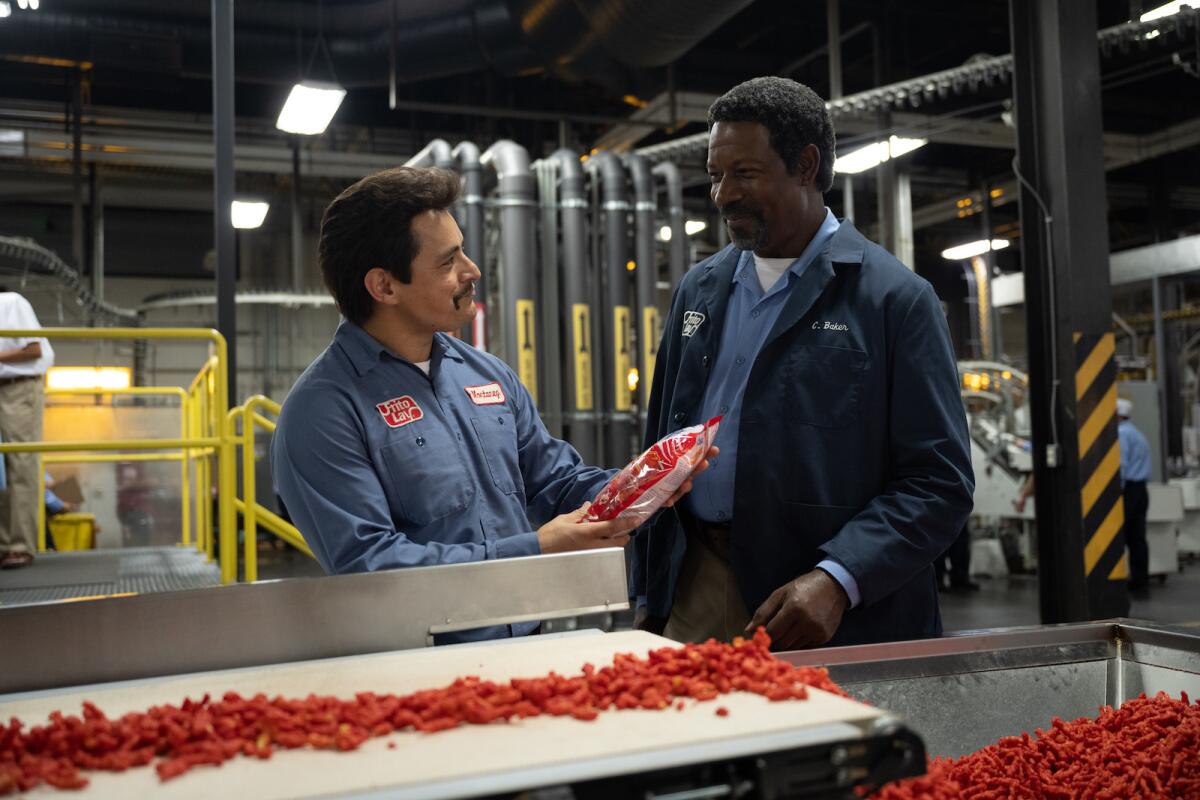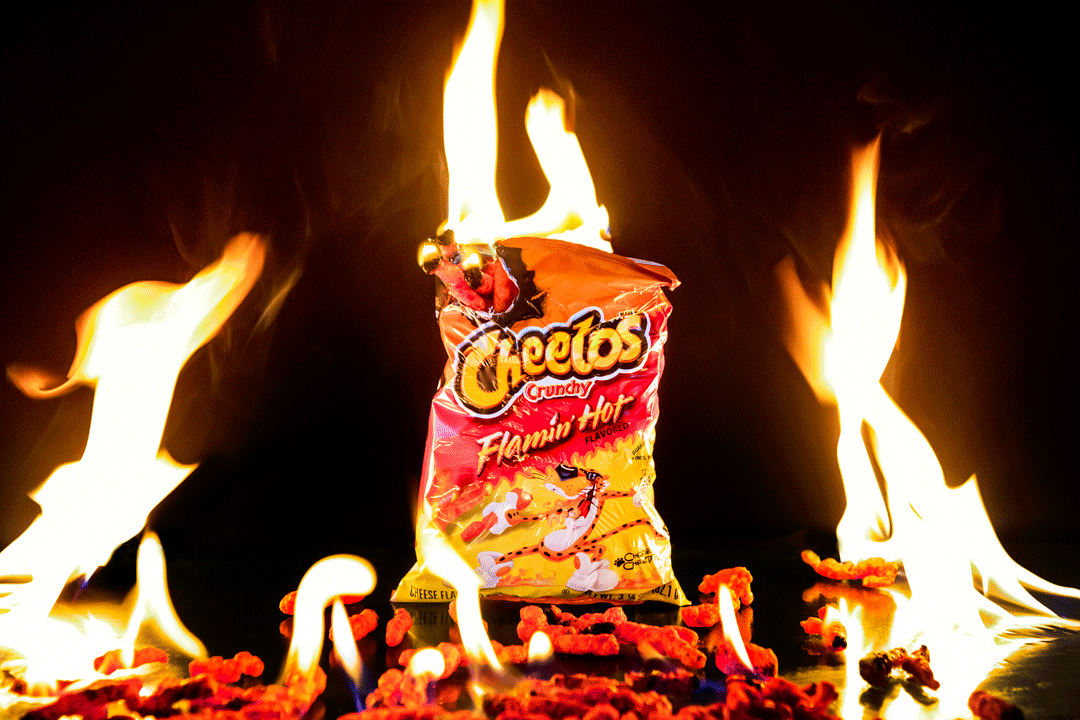Review: ‘Flamin’ Hot’ entertainingly prints the legend

Just as fiercely as the red slurry on Flamin’ Hot Cheetos sticks to one’s fingertips, the apocryphal legend that Richard Montañez, a Mexican American maintenance worker turned inspirational leader, invented the spicy variety of the popular cheese puffs adhered to the collective consciousness. Montañez’s campaign to promote his supposed entrepreneurial accomplishment has resulted in numerous public appearances, book deals, and now a biopic that marks the feature directorial debut of multi-hyphenate Eva Longoria.
Last year, however, The Times published an investigation probing the veracity of Montañez’s claim. Internal records from Frito-Lay and the account of another employee officially tasked with developing the fiery snack in the late 1980s categorically disprove his involvement in its creation or even in naming the product.
Richard Montañez has for years told a story of how he dreamed up Flamin’ Hot Cheetos while working as a Frito-Lay janitor. The archival record, former employees and Frito-Lay itself say otherwise.
Based on Montañez’s 2013 memoir, “A Boy, a Burrito and a Cookie: From Janitor to Executive,” the screenplay by Linda Yvette Chávez (co-creator of “Gentefied”) and Lewis Colick takes the subject’s version of the events as fact for a larger-than-life fictionalized account, which, like Mexican director Alejandro González Iñárritu’s recent “Bardo,” could also bear the title “False Chronicle of a Handful of Truths.”
On screen, actor Jesse Garcia (“Quinceañera”) plays Montañez with an unwaveringly winsome attitude. The performance traces his youthful days involved with gangs in the 1970s to his transition to a responsible family man eager to land a position at the Frito-Lay Rancho Cucamonga plant and beyond. Flashbacks with Garcia’s Spanglish voice-over walk us into episodes of racial discrimination in Richard’s childhood, his father’s abuse, and his lifelong romance with wife Judy (played by Annie Gonzalez).
In a standout role for an actor regularly seen in more serious parts, Garcia is an utter joy to watch. His disarming lack of cynicism and optimistic disposition while in Richard’s shoes compel us to wish the humble character’s grand aspirations materialize. May “Flamin’ Hot” serve as testament to Garcia’s range and ability to lead a cast. Meanwhile, a marvelous Gonzalez rides a similar wavelength of cheerful determination. A scene where Judy steps in to defend Richard from the judgment of his headstrong father, Vacho (Emilio Rivera), and another where he credits her for his success brim with earnestness.
Tonally, “Flamin’ Hot” plays like an heir to Chicano classics such as “Blood In Blood Out” or “My Family,” which eschewed emotional subtly, yet dignified the Mexican American experience with uplifting themes of pride and unity. Longoria and her actors lean into the cheesiness, pun intended, but not without winking at us in flights of imagination that communicate a layer of calculated mischief. Take as proof the amusing moments when Richard daydreams about corporate suits fighting each other using street slang.
The film stumbled at the box office 30 years ago but was saved from obscurity by Latino audiences, who reclaimed it as a cornerstone of their representation in cinema.
Previously behind the camera on a few TV episodes, Longoria fully flexes her ability to guide an ensemble into emotionally cohesive scenes. Despite a heavy reliance on snappy, musically driven montages, the end result is visually polished, with bright saturated colors and occasional narrative flourishes that add an unexpectedly idiosyncratic zest to the picture, effectively separating it from staler biographical affairs. Yet, while “Flamin’ Hot” entices us to want to see more from Longoria the director, its reverential demeanor toward a corporation for merely considering the input of its workers as valuable disappoints.
Richard’s ascent from the factory floor to the rooms of power, as told in “Flamin’ Hot,” entailed great tenacity: first asking his superiors to pronounce his last name properly, then shadowing seasoned machinist Clarence (Dennis Haysbert) and distilling his own knowledge of Latino consumers into a blend of chilies to coat an array of Frito-Lay products, before ultimately breaking the chain of command and taking his concept directly to CEO Roger Enrico (Tony Shalhoub).
Platitudes pave Richard’s personal and professional growth here, but even so, the intention to instill a sense of self-worth and the life-changing potential of perseverance feels noble. Rather than succumb to the white majority’s otherizing perception of his identity, Richard weaponizes the stereotypes, in this case Latinos’ preference for potent flavors, in his favor. At its core, the premise sustains that triumph is only worthwhile if earned without compromising your authentic self. Given the disputed details, this now seems a tad ironic.
No one denies the magnitude of Montañez’s rise. That alone merits commendation. But the contested part of his self-enshrined legend, the origination of Flamin’ Hot Cheetos, is probably the factor that persuaded book publishers and film executives to invest in his story in the first place. In other words, “Flamin’ Hot” the movie might not exist if not for that claim. That the on-screen Richard repeatedly claims to have embellished how events unfolded reads as an admission of guilt or an acknowledgment that versions may differ.
Taken solely as a product of make-believe, however, and detached from the controversies of the source anecdote, “Flamin’ Hot” turns out to be a surprisingly enjoyable crowd-pleaser. It mostly works because Garcia, Gonzalez and Longoria agree on a poignant, yet not sanctimonious approach that crystallizes the specific fortitude of mining hope from dire struggle.
‘Flamin’ Hot’
Rating: PG-13 for some strong language and brief drug material.
Running time: 1 hour, 38 minutes
Playing: Available on Hulu
More to Read
Only good movies
Get the Indie Focus newsletter, Mark Olsen's weekly guide to the world of cinema.
You may occasionally receive promotional content from the Los Angeles Times.












